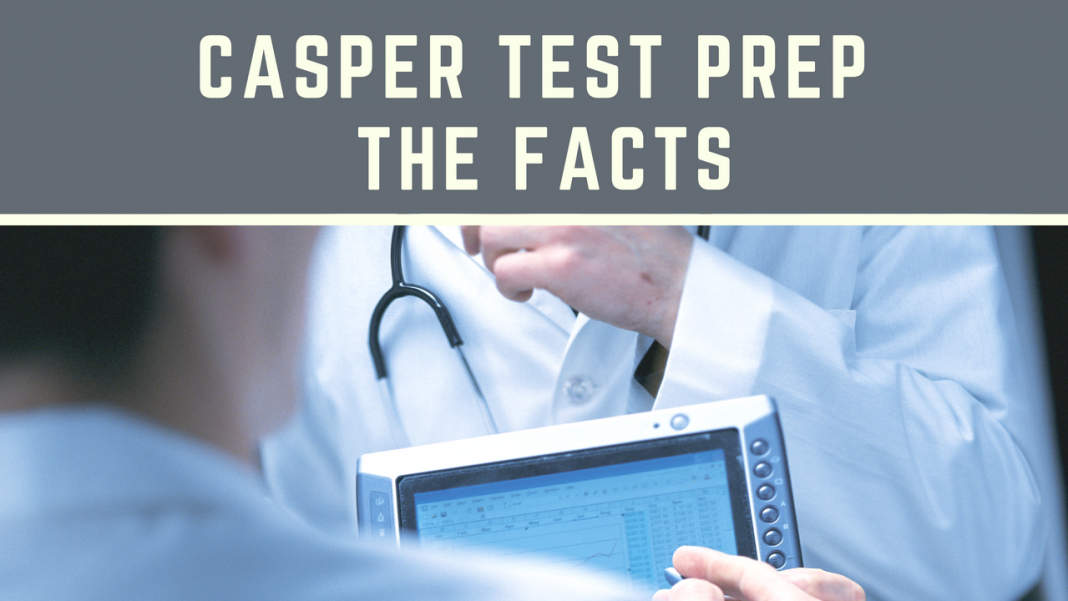There has been a lot of added anxiety this year due to the CASPer exam that many medical schools now require.
The good news is that based on what we are hearing from our students, these are not difficult “exams” and there is little to stress about! Read on to learn more about what to expect and how to prepare.

What are CASPer and Duet?
If you’re considering becoming a doctor, then you’ve probably spent hours if not days thinking about the MCAT exams. However, you might not be as familiar with the Casper exams.
Referring to tests known as the Altus Suite, Casper is a situational judgment test (SJT) that evaluates how you navigate complex social situations and dilemmas.If you’re applying to medical in the coming years, you can expect to take the following three tests as part of the process:
CASPer is a situational judgment test (SJT) used by medical schools (and other institutions) to evaluate how you respond to hypothetical scenarios.
So you ask, what are medical schools testing for?
The test assesses your personal qualities and characteristics, behavior, character, professionalism, how you think, what your values are, and how you respond to situations.
So keep in mind:
Using SJT’s like CASPer reflects a more holistic medical school admissions process that attempts to look beyond formal metrics like MCAT scores and GPAs.
I’m often asked: How do I take CASPer?
CASPer is taken online in the comfort of your own home.
Picture yourself sitting down at your computer, ready to take a test unlike any other you’ve encountered in your academic journey. This isn’t about memorizing facts or solving complex equations – it’s about showing who you are as a person and how you approach real-world situations. CASPER© is a situational judgement test (SJT) that offers a unique assessment and is becoming increasingly important in the medical school admissions process. With CASPER©, you will watch or read scenarios, and then answer open-ended questions about those scenarios via either recorded video response or typed response.
The Casper format requires you to either watch a social or workplace scenario or read a prompt, and then answer two questions that correspond to what you have watched or read. In the first part of Casper you will record your responses and in the second part of Casper you will type your responses.
Let’s talk about what you’ll actually experience during your CASPER test. The 2025/2026 year brought interesting changes to the format. You’ll start with video responses before moving to typed responses – a switch made to make the test more reliable. The entire experience will take between 65 and 85 minutes of your time. During this period, you’ll encounter 11 different scenarios that will challenge you to think on your feet and demonstrate your decision-making abilities.
Now, let’s break down it down
- Casper: Lasting 65-85 minutes, this online exam is designed to evaluate applicants’ situational judgement, as well as traits like professionalism, empathy, and ethics.
- Duet: This part of the Altus Suite is untimed and enables students to rate what is important to them. Medical schools use this information to see if students’ match a medical schools mission and values.
Taken together, the Casper and Duet assessments give medical schools a more holistic look at their applicants. Read on to learn more about this suite of exams, including when to take them and how best to prepare.


When to Take Casper and Duet
The good news is that students have a lot of flexibility when it comes to taking the Casper tests. Typically, the tests are offered at least one time every month, with more dates available during the summer and fall.
While individual medical schools have their own requirements, it’s a good idea to take the tests in the spring before you plan to apply. Doing this ensures you’ll have sufficient time to take all three parts of the exam and that your target institutions will receive your scores alongside your secondary applications. We typically recommend that students take Casper in June the year they are applying to medical school.
What to Know About Casper
CASPER© has TWO SECTIONS and a total of ELEVEN SCENARIOS.
Each section will have a combination of written and video scenarios
PART 1: 4 SCENARIOS WITH VIDEO RESPONSES
- After each scenario, you will have a 30 second reflection time
- There are 2 open-ended questions per scenario presented one question at a time
- You are allowed 10 seconds to read each question
- You are allowed one minute to record your video response for each question
PART 2: 7 SCENARIOS WITH TYPED RESPONSES
- After each scenario, you will have a 30 second reflection time
- Each scenario is followed by 2 open-ended questions, which will be presented on the same page.
- You have 3.5 minutes total to respond to both questions
Casper Parts 1 and 2
Part 1: The Video Response Section
Imagine you’re having a series of brief virtual conversations. You’ll face four scenarios. For each video scenario, you’ll first watch a short clip (about 1-2 minutes) that sets up a situation. Then comes the interesting part: you’ll have one minute to respond to each of two questions about that scenario.
It might sound something like this: “You are a team member in a group project…” followed by a video showing a challenging situation. Then you might be asked, “How would you handle this conflict?” You’ll need to think quickly and speak clearly, just as you would in a real-life situation.
You will have one minute to record each of your responses.
Part 2: The Written Response Section
After completing your video responses, you’ll move on to the written portion. Here, you’ll tackle seven scenarios that will be a combination of word-based and scenario-based. For each written scenario, you’ll have 3.5 minutes to respond to two questions. It’s like having a thoughtful conversation through text, where you have a bit more time to organize your ideas.
What to Know About Duet
The third test comprising the Altus Suite, Duet features two sections. The first part of the test asks applicants to consider what they’re seeking in a medical school. For example, you might be given a pair of characteristics related to student life or program attributes and asked to choose which is more important to you. Don’t be surprised if the test shows you the same characteristics multiple times in different combinations and groupings.
In the next part of the Duet test, students will compare the categories themselves. The goal is to help medical schools discover what you value as a student and decide whether you’d be a good fit for the program.
It’s important to note that test takers can change their response. However, you can only go back to the questions immediately before the one you’re currently answering. So, you should make sure you’re happy with your response before submitting it.
How do I prepare for CASPer?
You don’t! There is no need to prepare for the Altus suite of tests.
After signing up for CASPer, you will have access to practice tests as mentioned above. That said, we do offer a Casper course with one on one preparation if you feel this will help you.
Our advice is to write only one to two sentences to answer each question. If you have additional time once you are done completing the three questions for the scenario on which you are working, you can then go back and add more information.
The biggest mistake applicants make is writing too much and then running out of time so they can’t complete all of the questions.
As long as you answer the questions honestly, ethically, and show that you can see all sides of a situation, you will do well on these tests.
How do I Prepare for Duet?
Since Duet assesses your personal preferences, there is really know way to prepare. We advise you to give your most honest and authentic responses and be true to yourself.
If you only have a few schools that require Duet, you might review those medical schools’ missions to try and make sure your responses are aligned with the schools’ ideals as much as possible.
Do my CASPer Results Matter?
Your CASPer results will never make or break your candidacy and medical schools use these results to corroborate observations they make in other parts of your application such as your written documents, letters of recommendation and interviews.

Do You Need to Take These Tests?
Not all medical schools want to see applicants’ Casper results. However, many top schools do require the Casper exam, including Boston University, Penn State, Tulane, and Virginia Tech. If you already know where you plan to apply and your chosen schools don’t require Casper, you can probably skip these assessments. However, if you think your target list of medical schools may change or evolve, it’s a good idea to take the tests. In general, students don’t spend a great deal of time preparing for the Casper exams, so it won’t get in the way of other parts of the medical school application process. You can find a list of schools that accept Casper results here.
List of Medical Schools that Require CASPer and Duet
Always check with your individual medical schools if Casper is required as these requirements change all the time, but, at the time we completed this course, the following medical schools required Casper:
US Allopathic Medical Schools
Baylor College of Medicine
Boston University Aram V. Chobanian & Edward Avedisian School of Medicine
Burnett School of Medicine at TCU (Duet required)
California University of Science and Medicine
Central Michigan University College of Medicine (Casper recommended, not required)
Donald and Barbara Zucker School of Medicine at Hofstra/Northwell
Drexel University College of Medicine
East Tennessee State University James H. Quillen College of Medicine (Duet required)
Hackensack Meridian School of Medicine (HMSOM) (Duet required)
Indiana University School of Medicine
Louisiana State University School of Medicine in New Orleans
Medical College of Georgia at Augusta University
Medical College of Wisconsin
Meharry Medical College
Michigan State University College of Human Medicine (Choice of Casper or PREview; Duet recommended)
Netter School of Medicine Quinnipiac University
New York Medical College
Renaissance School of Medicine, Stony Brook University
Rush University Medical College
Rutgers University, Robert Wood Johnson Medical School (Choice of Casper or PREview)
Temple University Lewis Katz School of Medicine
Texas A&M University Health Science Center College of Medicine
Texas Tech Health Sciences Center El Paso Paul L. Foster School of Medicine
Texas Tech University Health Sciences Center School of Medicine (Duet required)
Tulane University School of Medicine (Casper and Duet recommended, not required)
University of Colorado School of Medicine
University of Nevada, Reno School of Medicine (Duet required)
University of Texas Health Science Center Houston, McGovern Medical School
University of Texas Health Science Center San Antonio, Long School of Medicine (Duet recommended)
University of Texas Medical Branch John Sealy School of Medicine (Duet required)
University of Texas Southwestern
University of Vermont Larner College of Medicine
Virginia Commonwealth University School of Medicine
Wake Forest University School of Medicine
Osteopathic Medical Schools
Arkansas College of Osteopathic Medicine
Kansas Health Science Center – Kansas College of Osteopathic Medicine
Sam Houston State University College of Osteopathic Medicine*Duet required*
Touro College of Osteopathic Medicine, New York
William Carey University College of Osteopathic Medicine*Duet required*
Canadian Medical Schools
Dalhousie University Faculty of Medicine
McGill University Faculty of Medicine and Health Sciences
McMaster University, Michael G. DeGroote School of Medicine
Memorial University of Newfoundland Faculty of Medicine
Queen’s University Faculty of Health Sciences
University of Ottawa Faculty of Medicine
Université de Montréal Faculty of Medicine
Université de Sherbrooke (except First Nations and Inuit)
University of Alberta Faculty of Medicine & Dentistry
University of Manitoba
University of Saskatchewan College of Medicine
BS/MD Programs
Albany Medical College
Hofstra University
Pacific Northwest University of Health Sciences
Texas Tech University Health Science Cente
CASPer Preparation & CASPer Test Questions
Where can I find sample CASPer scenarios?
The CASPer website offers three sample CASPer scenarios. So be sure to check the out at: https://takecasper.com/sample-casper-content/
Once you sign up for CASPer, you will have the opportunity to take a practice test with CASPer sample questions.
We have found that commercially available “CASPer test prep” is misleading and not necessary.
How do I register for CASPer and Duet?
If you’ve decided to take the Casper exams, the first step is to register for Altus Suite online. You can sign up to take the exams and select a Casper testing date on the website. After finishing this part of the test, you will be able to take the Duet sections any time within 10 days. The registration cost for all three tests is $85 for seven schools and $18 for each additional school..
Who evaluates my CASPer responses?
A different individual evaluates each of your CASPer responses. Each evaluator is blinded to your other responses.
But here’s the deal:
There is never a “right” or “wrong” response to the scenarios since the questions are open-ended and your responses are based on your own ideals and values.
How are my responses evaluated?
Your responses are evaluated on a five point scale from outstanding to poor. Your grammar and writing ability are not part of the assessment. Each Casper answer is rated so there are 22 data points in total.


How do medical schools use CASPer?
Keep in mind:
Your CASPer results are only used in the pre-interview screening process of the medical school admissions process.
What does this mean?
The results are considered along with your primary and secondary applications, letters of reference and transcripts to decide whether or not you will be invited for an interview.
So here’s the kicker:

Should I stress about CASPer?
Not for a minute. CASPer results are used by medical schools as a prescreening tool.
If you are emotionally intelligent and ethical you will do very well.
Need further CASPer inspiration?
Visit these forums:
About MedEdits
MedEdits helps students get admitted to medical school and residency programs. Our consultants have years of experience serving on medical school admissions committees, and as faculty members at the top medical schools in the country.
Need Help Navigating the Medical School Admissions Process?
Schedule a Free 15 Minute Consultation with a MedEdits expert.










